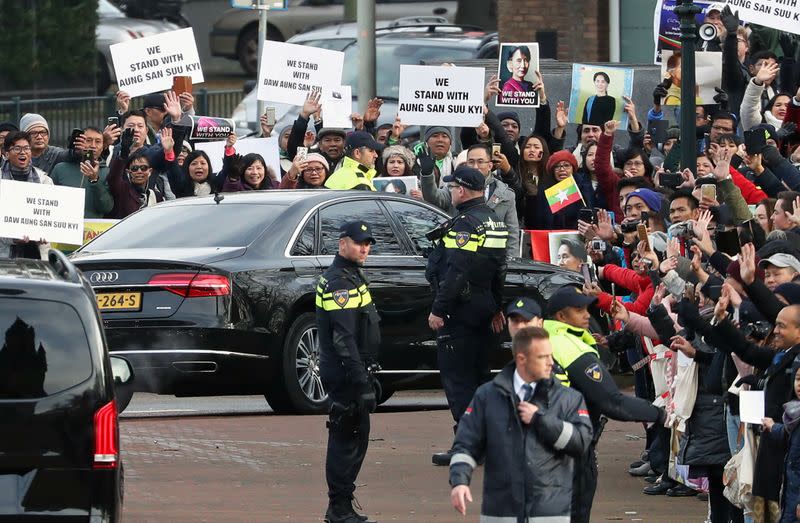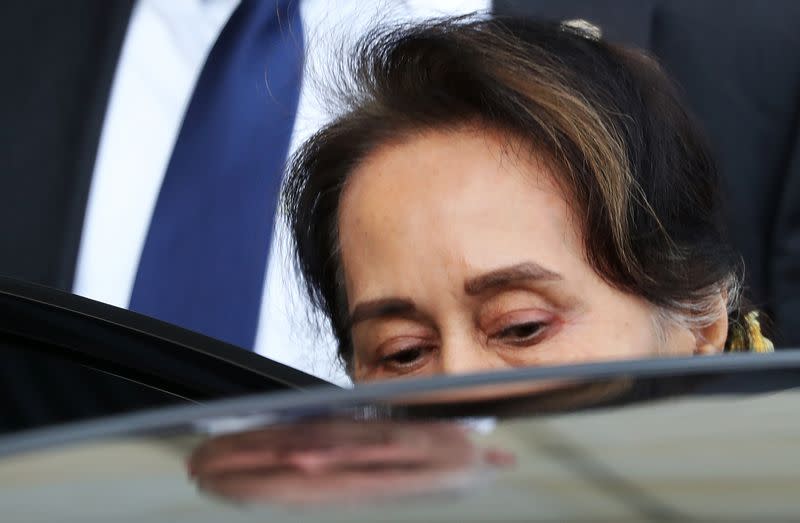Demonstrations mark case against Myanmar at U.N.'s World Court
THE HAGUE (Reuters) - Hearings are underway at the International Court of Justice in The Hague, where Myanmar is accused of genocide against its minority Muslim Rohingya population during a 2017 military crackdown.
Gambia, which initiated proceedings in November at the U.N.'s top court, asked the 17-member panel of judges to approve provisional measures - an order instructing Myanmar to halt activities that could aggravate the case or harm the Rohingya people until the case is heard in full, possibly in 2020.
Myanmar leader Aung San Suu Kyi said in opening remarks the case should not be heard in The Hague. Denying genocide took place, she said Gambia's allegations were "incomplete and misleading".
That request is expected to be ruled on within weeks, but cases at the tribunal, also called the World Court, can take years to conclude in full.
Demonstrations are being held in Myanmar, Bangladesh and outside the courtroom in the Netherlands, both for and against Aung San Suu Kyi, the country's leader and a Nobel Peace laureate.
Here is a collection of quotes from people taking part:
"I hope the truth would be on our side," said Ko Hla, 52, speaking in the commercial capital of Myanmar, Yongon, where hundreds of people gathered to watch a live broadcast of the hearings.
"Mother Suu went to the court to defend the truth. I also hope that the truth will be revealed."
Around 250 Suu Kyi supporters gathered outside the Peace Palace in The Hague, where they held photos of their leader and chanted: "We stand with you, Daw Aung San Suu Kyi. Mother Suu be healthy and be successful."
Cry Hlei Lian, 45, came from Yangon to support Aung San Suu Kyi:
"She comes here as a responsible leader and that’s why I am here to support her. Mother Suu is the only one who can lead the country to become peaceful and developed. We are neither denying or accepting genocide, but we support the stance of our mother Suu."
Human rights advocate Wai Wai Nu, speaking outside the court in The Hague, fought back tears as she spoke of her disappointment in Suu Kyi:
"I am very surprised with the fact that the leader we respected, loved and adored; I hoped several times for many years that she will stand on the side of victims, but she didn't stand and she denied the obvious and distinct atrocities with a straight face. That is so saddening."
Hamid Hossain, a Rohingya refugee in Cox's Bazar, Bangladesh:
"All of us are praying and many are fasting for justice. We pray to Allah that we will get justice. We're offering special prayers at mosques.
"We'll fight for our rights until the last drop of our blood. We won't let it go. We want justice. Our people were killed, our children were thrown into fire, our women were raped, our houses were burnt down. All we want is a fair trial. And through the trial, the truth will be revealed."
Ngu War Myint, 43, came from Denmark to the Netherlands with her husband to support Suu Kyi:
"I believe that mother Suu is the only one who can solve this issue. I came to support her.
"They can live in our country if they follow the rules, but we cannot give them (Rohingya) citizenship."
Nurul Amin, 30, who fled to Cox's Bazar with his pregnant wife:
"As we walked through the forest, we saw burnt villages and dead bodies during our 12-day journey to Bangladesh. My wife was two months pregnant. I still shiver in fear when I think of those days. I hope the truth will be revealed through a fair trial."
Pencilo, who came to The Hague from Myanmar to support Suu Kyi and held a rose for her outside the courtroom:
"Our country's leader is standing at the front and solving the issue and I want to be dutiful as a citizen so I came here.
"Supporting Daw Aung San Suu Kyi does not mean we support genocide. Daw Aung San Suu Kyi also doesn't support genocide. This situation is like our whole country is being sued. The court will decide on it. We are just supporting our leader, who is solving the issue for the interest of the country."
(Reporting by Shoon Naing in The Hague, Ruma Paul at Cox's Bazar, Bangladesh, and Sam Aung Moon in Yongon; editing by Alex Richardson, Larry King)



